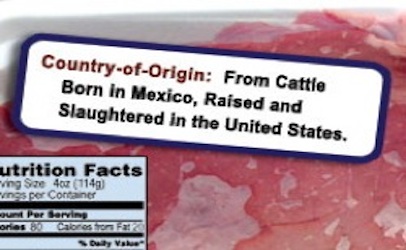Meat Industry Loses Appeal on Country-of Origin-Labeling – Now waiting WTO decision – But Why?
I have a totally different concern about this issue, the importance of which dwarfs consumer rights. Whenever any country, in this case America, passes legislation which in this case is labeling, all countries must now submit such legislation to WTO for approval. As such, we have jettisoned our sovereignty to WTO, which allegedly possesses more wisdom than we do, and directs activities on this globe. We have willingly acquiesced our autonomy to another body. USA is now USW, as in United States of the World. Did you ever think we would witness a 1-world government in our lifetime? If Americans are truly sincere global citizens, we will endorse WTO’s right to direct our activities. Of course, this benefits transnational companies, which desire unfettered, seamless global trade, ignoring obvious food safety & environmental & labor issues which are systemic in some countries. Anyone who disagrees is labeled a "protectionist". Hmmmmm…………..I’m all for protecting the rights of America’s Ag sector and the fundamental rights of Americans to work, especially when we realize how citizens (including children) of third world countries are willing to work for a couple bucks a day competing against us. Equivalency, eh? WTO ensures that Americans are global cirtizens first, and Americans second. WTO is more focused on maintaining control over the earth’s citizens, than it is over product labeling. John Munsell
Meat Industry Loses Appeal on Country-of Origin-Labeling
By News Desk | July 29, 2014
The meat industry may still be waiting on the World Trade Organization to make a call on country-of-origin labeling (COOL), but in the meantime they’ve lost another round in their fight against the rule in the D.C. Circuit courts.
COOL laws mandate that meat products be labeled to tell where the food animals were born, raised and slaughtered. The American Meat Institute (AMI) has challenged the laws in U.S. courts on behalf of meat producers in the U.S., Canada and Mexico.
Writing the majority opinion, U.S. Circuit Judge Stephen Williams said that the interest of providing consumers with information overcame claims of free speech raised by AMI.
Tuesday’s decision by a split court of 11 judges reinforced an earlier decision made by a panel of three.
“The court’s decision today is disappointing,” said AMI Interim President and CEO James H. Hodges in a statement. “We have maintained all along that the country of origin rule harms livestock producers and the industry and affords little benefit to consumers. This decision will perpetuate those harms. We will evaluate our options moving forward.”
Consumer groups, on the other hand, celebrated the decision.
“We applaud the D.C. Circuit decision, which is an important victory for the U.S. public’s right to know how their food is produced,” said George Kimbrell, senior attorney at the Center for Food Safety. “The Court confirmed that manufacturers do not have the right to avoid basic factual disclosures about their food products.”
The COOL law was adopted by the U.S. Department of Agriculture in May 2013, but enforcement of the rule is still developing.
Canada and Mexico have both filed complaints to the World Trade Organization on COOL. A decision from the organization is still pending.
© Food Safety New
